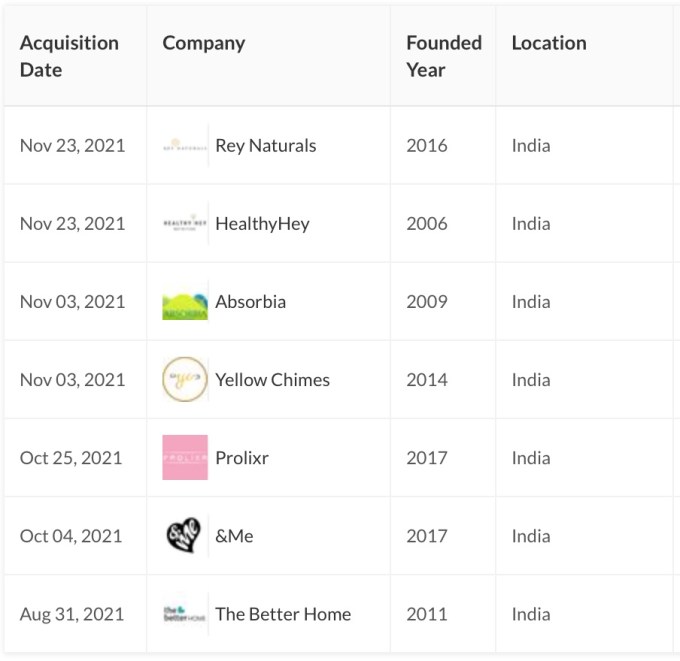India’s GlobalBees joins unicorn club for its Thrasio-like house of brands
GlobalBees, which raised one of the largest Series A financing rounds in India earlier this year, has entered the unicorn club as the New Delhi-headquartered firm scales its Thrasio-like house of brands. Premji Invest, the investment firm controlled by Indian tycoon Azim Premji, led the nine-month-old startup’s Series B financing round, the young firm disclosed […]

GlobalBees, which raised one of the largest Series A financing rounds in India earlier this year, has entered the unicorn club as the New Delhi-headquartered firm scales its Thrasio-like house of brands.
Premji Invest, the investment firm controlled by Indian tycoon Azim Premji, led the nine-month-old startup’s Series B financing round, the young firm disclosed in a regulatory filing. The round, whose size is about $110 million, values GlobalBees at over $1.1 billion, the filing showed.
Steadview Capital, Trifecta Capital (which invested $30 million in debt in the new round) and existing investors SoftBank, FirstCry also participated in the round.
Founded by Nitin Agarwal, formerly of Edelweiss Financial, and Supam Maheshwari, a founder of FirstCry, GlobalBees acquires and partners with digitally native brands across categories such as beauty, personal care, home and kitchen, food and nutrition, and sports and lifestyle with a revenue rate of $1 million to $20 million.
GlobalBees helps these firms scale and sell to marketplaces and through other channels in India and outside of the South Asian market.
“We have created and engaged with brands in the past and realized that most of these brands reach a scale after which it becomes too difficult to scale them,” Agarwal told TechCrunch in an interview earlier this year.
“Supam and I have been talking about this for several years, trying to find ways to disrupt this market. We think there’s an opportunity to create a new house of brands that is digital-native.”
At the time, Agarwal said GlobalBees was looking to acquire up to three dozen brands. Indian news and analysis publication the CapTable, which reported about GlobalBees’ talks to raise a round at the unicorn valuation in October, said then that GlobalBees was in different stages of conversations to close deals with at least 15 brands. GlobalBees had no comment.

Some of the brands GlobalBees has acquired in recent months. (Data: Tracxn)
Scores of startups in India today are trying to replicate what is popularly known as the Thrasio-model. (Though it’s worth noting that Thrasio took about two years to become a unicorn.)
Mensa Brands, a similar venture by former fashion e-commerce Myntra’s chief executive, recently raised its $135 million Series B financing round that valued the startup at over $1 billion. It was six-month-old at the time of the funding announcement. Titan Capital, which has backed about 200 startups in India, has invested in Powerhouse91. 10club, another similar startup, raised $40 million earlier this year— though much of it was in debt.
Like Thrasio, several of these firms are trying to acquire brands that sell midrange to high-end products in categories where competition is limited. In fact, some of the categories that are common among these brands are so underappreciated that even Amazon and other e-commerce firms have not explored them through their private label ecosystems.
With over 800 brands, India is quickly becoming a fast-growing market for direct-to-consumer brands.
Many investors believe that Amazons and Flipkarts of the world have laid the railroads for digital commerce, and smarter and more profitable businesses can be built atop of them.
“Newer models on social commerce will continue to penetrate deeper into Bharat while revenue based financing models will provide an alternate financing option to equity dilution conscious smaller D2C brands. At the same time, consumers will demand frictionless post-checkout journey (auto filled card/ customer details, RTO predicts, one step checkout). Startups providing shovels in the gold rush (Shiprocket, GoKwik) will have the potential to reap big wins,” a recent analysis said.
GlobalBees joins over 40 other India-based startups that have entered the unicorn club this year, up from 11 last year. Several high-profile investors including SoftBank, Falcon Edge Capital, and Tiger Global have doubled down on their investments in the South Asian market in recent quarters.







